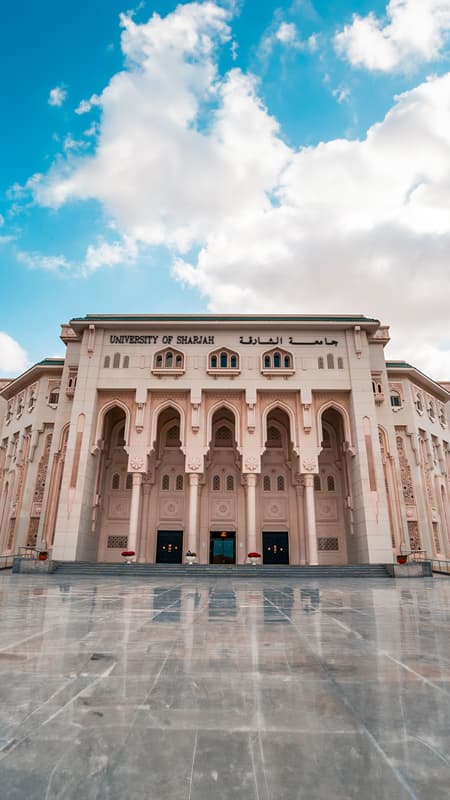With the Participation of Researchers and Specialists in the Field: The University of Sharjah Discusses the Substantive and Procedural Legal Aspects of COVID-19
Stemming from the University of Sharjah's attention to keeping pace with events and developments at the local and regional levels resulting from the spread of the COVID-19 pandemic, the College of Law at the University organized the International Scientific Forum "The Substantive and Procedural Legal Aspects of COVID-19." The Forum aims to analyze and determine the legal dimensions as well as the substantive and procedural implications of developments arising from the spread of the COVID-19 pandemic. This under the patronage and in the attendance of His Excellency Hamid M.K. Al Naimiy, Chancellor of the University of Sharjah, and with the Prof. Imad Eldin Abdul Hay, Dean of the College of Law, Prof. Sanford R. Silverburg, Keynote Speaker from the United States, and faculty and staff members and graduate students from various international universities.
In his speech on this occasion, His Excellency Hamid M.K. Al Naimiy welcomed the attendees and participants in the forum, and extended gratitude to His Highness Sheikh Dr. Sultan bin Muhammad Al Qasimi, Member of the Supreme Council, Ruler of Sharjah and President of the University, for his wise directives to establish a COVID-19 testing center at the University of Sharjah. This comes as part of the precautionary and preventive measures that have been applied at the University of Sharjah to protect and care for all its faculty and staff members and students, and at the same time to be a scientific research center to conduct scientific research and specialized studies in this field.
He added that the spread of COVID-19 has resulted in many conflicts and challenges at all levels, which require further studies and scientific research to determine their effects and implications on all aspects whether legal, social, economic, etc. The University of Sharjah, he continued, worked on this basis to organize this scientific forum at the College of Law, which deals with the most important substantive and procedural aspects of the emerging pandemic at the local, regional and global levels. It examines its direct impact on many local and international legal and contractual obligations of all kinds and nature. His Excellency the University Chancellor also emphasized that this role that the University of Sharjah plays comes from its scientific and academic standing, and its commitment to serving the local community, and demanded that the results and scientific recommendations that will come out of this Forum be shared for the benefit of all.
For his part, Prof. Imad Eldin Abdul Hay, Dean of the College of Law, presented an overview of the Forum, pointing out that the pandemic has left its direct impact on many local and international legal and contractual obligations of various types and nature. He added that this Forum will address the most important legal aspects from a procedural point of view at its different stages and types, including civil, commercial, administrative and penal before various national and international courts and national arbitration bodies and international.
The keynote speaker, Prof. Sanford R. Silverburg, from the Department of History and Politics at Catawba College in Salisbury North Carolina in the USA, reviewed in his speech the effects of COVID-19 on the economic, social and health levels, and the role of international trade law in providing basic provisions related to the public health of each country to limit the outbreak of this pandemic. He also touched upon the international efforts exerted to contain the crisis, and the special units that have been established in the World Health Organization to deal with it, stressing the need to establish an international umbrella to protect human rights in unusual circumstances, with the need to unify procedures and legislation related to COVID-19. The umbrella would also provide international financing for the purpose of dealing with future crises. He then pointed to the important role of international lawyers in focusing on the fundamental and real issues that must be faced immediately with governments.
Through four scientific sessions and 16 research papers, this Forum dealt with many themes, namely: the impact of the COVID-19 on the substantive aspects of private law, the substantive legal aspects of public law, the procedural aspects of private law, and the procedural aspects of public law.
At the end of the Forum sessions, several proposals were recommended, including the need to regulate the means of renegotiation in all contracts, especially commercial contracts, in light of the occurrence of circumstances changes that would lead to a disturbance of the economic balance in those contracts, such as with the COVID-19 pandemic. This so the regulation includes conditions the work of the means of renegotiation, the scope, and the legal effects that result from it. Also, the Forum resulted in a recommendation of the necessity for the parties to agree to stop the implementation of the contract when the re-negotiation clause is made in a manner that accurately addresses the features of that moratorium in terms of the duration of the suspension and the obligations of the contracting parties during that period, especially with regard to their obligation to maintain the contract in certain ways, and their obligation to resume the validity of the contract.
It was also recommended that the use of virtual litigation to face global emergencies should be secured and facilitated, which is a strategic goal that must be followed by all countries of the world by preparing technical, technological and legislative structures necessary to implement it. This includes the establishment of information and virtual courts aimed at researching new means and systems for registering cases, presenting electronic documents, pleading, presenting means of appeal and following them up, obtaining and implementing the judgment decision, and recording procedures and conducting trials in general by non-traditional means characterized by modernity, high speed and accuracy in deadlines and virtual attendance.



